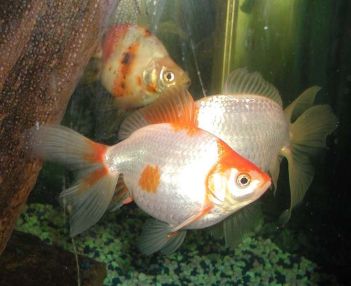By Christina Colletti

Goldfish have surpassed humans in the length of their attention spans. Courtesy of Wikimedia
I am going to ask a favor of you. I would like you to defy science for a few minutes and stay attentive in reading my article. The time it has taken you to read the first two sentences is the length of the human attention span which, according to scientists, is a mere eight seconds. Our mental capacity is exhibiting a terrible trend with no signs of improving.
Almost everyone has heard the common axiom that a scatterbrained person has “the attention span of a goldfish.” Well, we members of mankind have officially been surpassed in concentration ability by goldfish, who stand (swim?) at nine seconds. This number is down from the 12 second human attention span reported by Time magazine in 2000, when cell phones began increasing in popularity.
Humans undoubtedly have more trouble focusing today than ever before. In our defense, several studies show that this deteriorating ability to focus may coincide with our cell phone dependency. In the 10 minutes that I have spent at my computer telling myself to start writing, I have checked my phone three times. I have refreshed both my Instagram and Facebook. I have sent two Snapchats and five iMessages. While it may appear that I have an incredible ability to multitask, having my cell phone inches from my fingertips makes it incredibly difficult to stay focused on a single project.
Reading, studying, and even sitting in class for an extended period of time can pose a struggle due to the presence of our smartphones. We find ourselves lost in thought far too often, needing to either re-read lines we had already looked at or asking those around us to repeat themselves. Additionally, using smartphones definitely contributes to our lack of patience. With the world at the touch of a finger, we are awarded instant gratification.
Text messages allow us to stay in constant contact with others and social media give us live updates on all of our acquaintances, further satisfying our craving for immediacy. We live in the wold of “let’s ask Siri” or “I bet there’s an app for that.” We do not even need to do basic math to determine how to split the tip a restaurant — all that’s needed is to plug the base amount into a tip calculator application.
What a time to be alive.
I believe that this craving for immediate gratification explains our weakening attention spans. With the desire to always think ahead and keep moving, we find it difficult to stay still in this ever-changing world. This is evident in the way in which applications are always updating, new program features are continuously added, and new cell phones are designed and released every few months. In this technological world, our brains are hitting “refresh” just as fast as we are on our various forms of communication.
Nothing.
Slows.
Down.
Jessica Knowlton, FCRH ’17 is a psychology student who found that this phenomenon can be explained in terms of psychological principles.
“One can only devote a short amount of time to each stimulus, for the fear of missing the next one,” she said. “The human brain was not designed to cope with such high demands that today’s fast paced society dictates. If we devote large amounts of time to each stimulus, the result would be chronic stress or burnout, thus the brain has most likely evolved a shorter time span to prevent such consequences.”
Our struggle to stay attentive does not have an easy fix. So far, we have frequently made cell phones our scapegoats when coming to terms with the fact that the goldfish we brought home from the carnival can hold a thought for an entire second longer than we can.
However, if a collective cellphone dependency is the root of our attention span problem, we have some control over it. Let us try keeping our phones in another room when doing homework or not Snapchatting other people when we are out with our friends. While in class, let us just turn our phones off. Phones come with power buttons — seldom used, but there nonetheless.
There is a good chance that we will benefit from reducing our technological distractions. Sending texts and emails or posting pictures can wait. Until we teach goldfish how to operate cell phones to weaken their attention spans, the only way to save ourselves from this utter embarrassment is by making changes in our everyday lives.
Christina Colletti, FCRH ’17, is an English major from Manhasset, New York.

[…] Why Your Goldfish Is More Attentive Than You Almost everyone has heard the common axiom that a scatterbrained person has “the attention span of a goldfish.” Well, we members of mankind have officially been surpassed in concentration ability by goldfish, who stand (swim?) at nine seconds. Read more on Fordham Ram (registration) […]